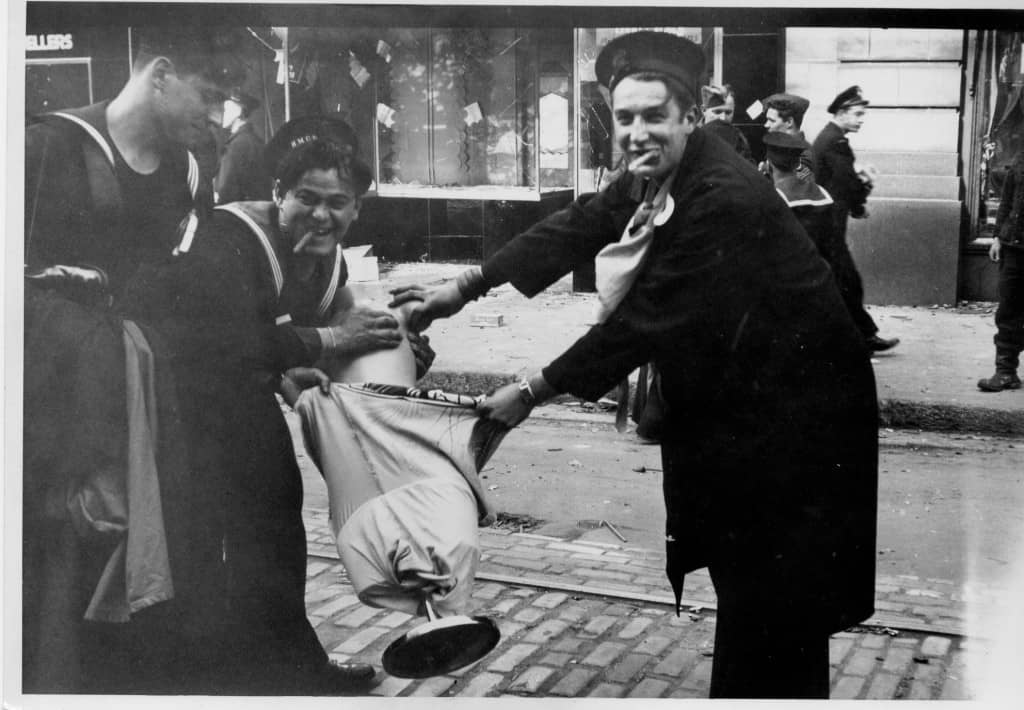
He and some of the K of C centre staff had decided to take an early morning walk through the downtown to see for themselves what the riots had done. It was quiet now, almost eerie. There were disheveled bodies everywhere, not dead but dead drunk. Sleeping off the excesses of the night before. On lawns. On sidewalks. In the gutters. Even in the middle of the streets.
They’d walked up and down the streets — north on Lower Water to Duke Street and then up to Barrington, south along Barrington through the worst of the broken glass and ravaged storefronts to Spring Garden Road, up and down Spring Garden back to Barrington and then finally cutting past the Lieutenant-Governor’s to Hollis Street for the last few blocks back to the centre.
Sutherland thought it couldn’t get any worse. But then it did. They were just a block from the services centre, hurrying now to escape the foul smells of stale beer, vomit and charred wood, when they saw a couple huddled together on the steps of what had once been a small variety store. When he first saw them hugging each other, Sutherland couldn’t help thinking they looked like young lovers. Except they weren’t young. And they were both sobbing. Then he recognized them. They were the husband and wife owners of the shop. Sutherland used to stop there occasionally for a candy bar or some shaving cream. He’d talked to them, heard their proud stories of a son who was a career navy man and their two grandsons and granddaughter who had served overseas. One of their grandsons, they told Sutherland sadly, had been killed on the beaches of Normandy. The mob didn’t know any of that. They’d simply run riot through their tiny store because it was there. They’d stolen what they wanted and smashed the rest. Their business was gone.
Sutherland felt revulsion, but confusion too. Didn’t these hooligans know that hundreds, perhaps thousands of their fellow servicemen had walked out of this little store with free cigarettes, or candy, or pop, because the couple knew most of them didn’t have much spending money left after sending most of their allowances home and they wanted to do a little something nice for “the boys”? Didn’t they know? Or didn’t they care?
As Sutherland walked up to the man and woman, they at first looked frightened. But then they recognized Sutherland and threw open their arms. He hugged them. So did the others.
“Come back with us,” Sutherland said finally. “There’s nothing you can do here.”
He took them into the centre’s cafeteria where dozens of young men, most of whom had spent the night in the residence, were still eating their breakfast along with a few exhausted Shore Patrol officers on their way back to barracks for a few hours’ rest.
One of the SP officers, after hearing what had happened to the old couple, began to cry. He grabbed Father Wingle’s priest’s cap off his head, took his wallet out of his pocket and dumped all his bills into the cap. Turning to the diners, tears streaming down his cheeks, he barked like a drill sergeant. “Come on,” he said, pointing to the cap. Within a few minutes, he’d collected close to a thousand dollars, which he handed over to the shopkeepers. By then, everyone was crying.
Excerpted from Sailors, Slackers and Blind Pigs: Halifax at War, Doubleday, 2002. To purchase from Amazon, click here.






 STEPHEN KIMBER, a Professor of Journalism at the University of King's College in Halifax and co-founder of its MFA in Creative Nonfiction Program, is an award-winning writer, editor and broadcaster. He is the author of two novels and eight non-fiction books. Buy his books
STEPHEN KIMBER, a Professor of Journalism at the University of King's College in Halifax and co-founder of its MFA in Creative Nonfiction Program, is an award-winning writer, editor and broadcaster. He is the author of two novels and eight non-fiction books. Buy his books